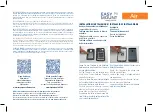
192
Terms and definitions
This is the Internet version of the user’s guide. © Print only for private use.
SGML
A generic markup language for representing documents.
SIM
A SIM (Subscriber Identity Module) card is a ‘smart card’,
inserted into GSM phones, that contains your phone account
information. SIM cards can also be programmed to display
custom menus for personalized services, for instance to assist
operators in providing mobile commerce applications.
SMIL
Synchronized Multimedia Integration Language. Used by MMS
to describe how media items are to be played.
SMS
Short Message Service. Allows messages of up to 160
characters to be sent and received via the network operator's
message centre to a mobile phone.
SMTP
Simple Mail Transfer Protocol. Protocol used to send email
from an email client via an SMTP server.
SWIM
A SWIM card is a SIM card containing a WIM.
SyncML
SyncML is a universal protocol for data synchronization,
developed by the SyncML Initiative Ltd.
TCP/IP
Transmission Control Protocol/Internet Protocol. TCP/IP is the
basic communication language or protocol of the Internet. It can
also be used as a communications protocol in a private network
(either an intranet or an extranet).
TLS
Transport Layer Security. Used by Web browsers, for example.
URL
Uniform Resource Locator. Points to a service or information on
the Internet, for example:
USB
Universal Serial Bus. A plug-and-play interface between a
computer and add-on devices (such as audio players, joysticks,
keyboards, phones, scanners, and printers). With USB, a new
device can be added to your computer without having to add an
adapter card or even having to turn the computer off.
USSD
Unstructured Supplementary Services Data. Narrow-band GSM
data service. For example entering *79*1234# might return the
stock price for stock 1234.
vCal; vCalendar
vCalendar defines a transport and platform-independent format
for exchanging calendar and scheduling information for use in











































